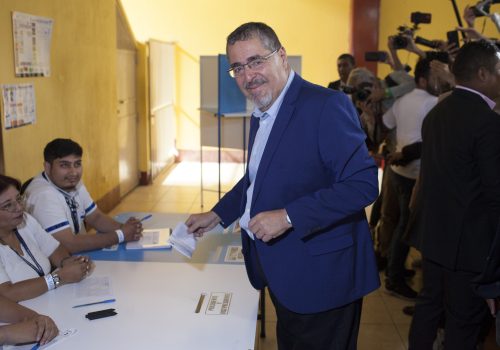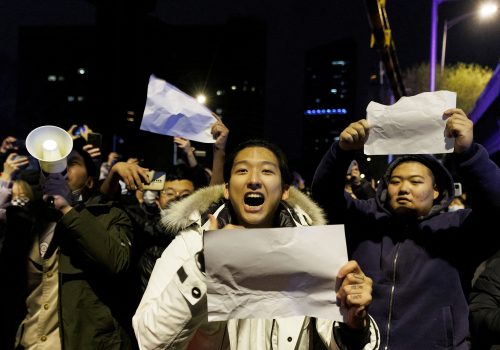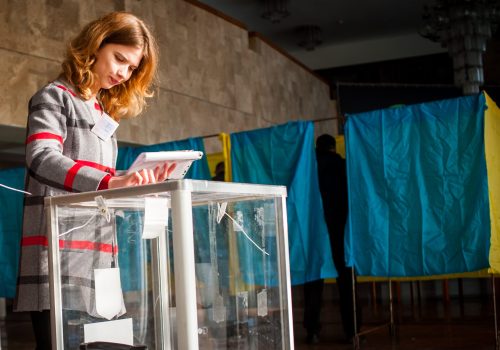Six ways for the US to put democracy back on the global agenda in 2024
As the United States heads into an election year amid a spate of profound global crises, the political debate will no doubt turn at some point to the Biden administration’s performance on foreign policy. Yet one critical area that will likely remain insufficiently analyzed is US President Joe Biden’s performance on global democracy issues.
While Biden came into office affirming the importance of shoring up democracy overseas as a core national interest, such promises have often not been backed up with action. The White House’s two high-level democracy summits, in December 2021 and March 2023, highlighted the importance of good governance. But summitry does not equate to a strategy. At a time when anti-democratic forces are driving global instability, this is a policy area that the United States can ill afford to ignore. American leadership—and above all, action—is critical.
With a contentious election to fight and multiple foreign policy challenges to grapple with, it may be tempting to relegate the work of advancing democracy to a minor item on Washington’s foreign policy agenda. Yet enhancing democratic resilience is essential to the overall effort to promote global security and protect core US interests.
Looking ahead at this year, the Biden administration must continue to counter the Chinese Communist Party’s authoritarian influence overseas and associated undermining of democracy in strategically important areas—and it must allocate more resources to do so. In addition, here are six strategic areas that the White House should focus on as part of a bolder democracy agenda. Further US leadership in these areas is necessary to address critical challenges around the world that affect core US interests.
1. Prepare resistance stakeholders for a post-conflict transition in Burma. Pro-democracy resistance forces are gaining momentum in Burma, while the junta continues to weaken, indicating that the ongoing revolution may be moving into a new and possibly final phase. With the country awash in weapons, teeming with historic and unresolved grievances, lacking a central authority to maintain order, and facing sky-high expectations, the post-revolution transition could be the most dangerous period in Burma’s history. The United States should urgently increase support for the interim government and for ethnic resistance organizations, with a particular focus on capacity building in transition planning. US support can also advance disarmament, demobilization, and reintegration, as well as ceasefire and peace negotiations. This work can help establish local institutions to implement federal democracy in the country.
2. Shore up democratic champions across Asia that are preserving democratic space in closed societies (Burma, Cambodia, China, and North Korea) and in entrenched anti-democratic systems (Thailand and Bangladesh). Democratic activists in these difficult environments are often the only hope for preserving civic space and rights. The United States can help keep their cause alive by providing moral, technical, and financial support to those fighting for democracy and fundamental freedoms. This assistance should prioritize building connections between activists across the region to facilitate sharing of successful tactics and fostering support networks among activists—networks that activists routinely cite as crucial to strengthening their cause.
3. Support conditions for democratic reform in Guatemala by investing in political party development and consensus building. The incoming Arévalo administration will face obstacles to reform from a corrupt judiciary; from a legislature, in which its party is in the minority; and from the private sector, relations with which have been characterized by suspicion and mistrust. The new government will need sustained support, in the form of media protections and civil society oversight, to maintain stability and credibility in the face of these obstacles. The Semilla movement, which propelled Arévalo to victory, will also need assistance strengthening its own party structure and reaching consensus on reform priorities with other political parties, the private sector, and the citizens and protesters—including indigenous movements—that defended recent election results.
4. Support democratic governance structures in a post-Hamas Gaza. Forging a governance strategy for a post-Hamas Gaza is perhaps the most difficult political and security challenge facing the Biden administration. Some are looking to the Palestinian Authority (PA) in the West Bank as part of a solution. Yet for more than a decade, attention to governance and civil liberties in the PA has slipped from the West’s lists of priorities, and with it funding and support for institution-building and rule of law. If Israel, the United States, and other powers determine that the PA is best positioned to help govern Gaza, then Washington should offer a robust package of democracy and human rights-strengthening assistance, coupled with engagement, focused on ensuring that democratic outcomes rank high on the list of Western priorities. Stringent safeguards must also be put in place to prevent misappropriation of these United States-provided resources.
5. Press for free and fair elections in Africa to reverse the deficiencies of 2023. From Nigeria to Eswatini, flawed elections in 2023 harmed democracy across sub-Saharan Africa. US attention and resources can help reverse this trend in 2024, when voters will go to polls in South Africa, Guinea, Ghana, and Senegal. Support should begin far in advance of election day, in order to strengthen the conditions for free and fair polls. Assistance should include a renewed focus on strengthening critical components of successful elections, including voter registration, campaign finance, election observation, polling agent capacity, and parallel vote tabulations.
6. Proactively counter Russian political influence in Europe, particularly in Bosnia and Herzegovina (BiH). Rampant corruption and political clientelism are undermining trust in democracy and driving the young and educated to emigrate from BiH. Separatist forces in Republika Srpska are reportedly colluding with Russia and undermining prospects for further integration with the West. The United States should strongly support pro-democratic forces and focus assistance on further strengthening political parties, thereby empowering these actors to address the root causes of corruption. With the help of the United States and European countries, BiH can enact reforms necessary for its Euro-Atlantic integration and help restore citizen trust in the political process. Greater support from partners should seek to assist democratic actors among the Bosniak, Croat, and Serb populations, and to prioritize longer-term investment in promising leaders—especially youth and women—in politics and civil society.
Biden has both an obligation and a political interest in showing that the United States remains the leader of the free world—with all the responsibilities and benefits that title entails. As 2024 begins, his administration must take urgent steps to put its pro-democracy rhetoric into action in key theaters around the world.
Patrick Quirk is the vice president for strategy, innovation, and impact at the International Republican Institute and a nonresident senior fellow with both the Atlantic Council’s Freedom and Prosperity Center and Scowcroft Strategy Initiative at the Scowcroft Center for Strategy and Security. He previously served as a member of the US secretary of state’s Policy Planning Staff as the lead advisor for fragile states, conflict and stabilization, and foreign assistance.
Further reading
Wed, Aug 23, 2023
Bernardo Arévalo’s against-the-odds rise in Guatemala is chance to improve US relations
New Atlanticist By María Fernanda Bozmoski, Eva Lardizábal
The candidate’s landslide victory in the August 20 presidential runoff election marks a new path for Guatemala and invites deeper US engagement.
Tue, Mar 7, 2023
How policymakers should fight for freedom and prosperity in a world of rising autocracy
New Atlanticist By Yomna Gaafar, Joseph Lemoine
Researchers unveiled new data at the Atlantic Council that can help policymakers promote democracy and turn the tide of autocratization in regions around the world.
Thu, Oct 19, 2023
Ukraine needs electoral reform now for resilient postwar elections
UkraineAlert By
Prioritizing electoral reform now will position Ukraine for postwar democratic resilience and will underscore the nation’s dedication to sustaining and improving its democratic traditions, even in the face of great adversity.
Image: US President Joe Biden delivers remarks during a virtual Summit for Democracy, which he is hosting from an auditorium on the White House campus in Washington,, March 29, 2023. REUTERS/Jonathan Ernst


